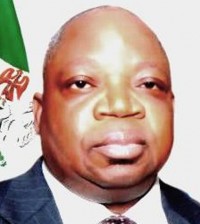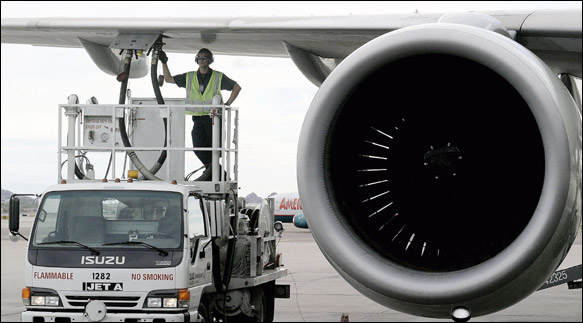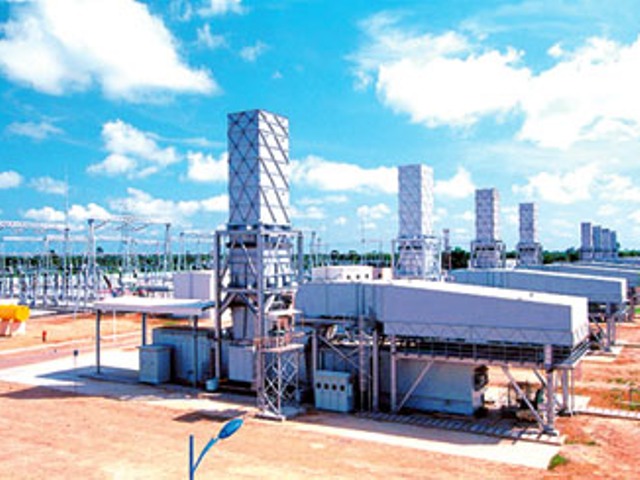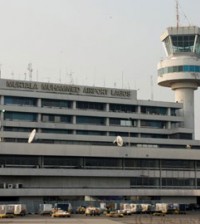Nigerian MDGs information system to be made public – FG
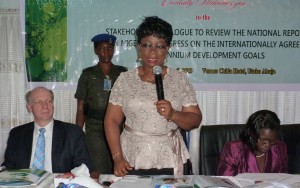
SSAP MDGs Dr Precious Gbeneol, (middle) at the Stakeholders forum for the preparation of National report for NVP in Abuja
The Nigerian Millennium Development Goals, MDGs Information System, (NMIS) will be made open to governmental and non-governmental entities for use in policy planning, Dr. Shamsudeen Usman, the Minister of National Planning said revealed this in his keynote address at the National Dialogue on Nigeria’s National Voluntary Presentation, NVP on the progress made on International Agreed Goals, IAGs, including the Millennium Development Goals on Thursday.
Dr. Precious Gbeneol, Senior Special Assistant to the President on Millennium Development Goals, OSSAP-MDGs will present Nigeria NVP at the Substantive Session of United Nations Economic and Social Commission (ECOSOC) Annual Ministerial Review, AMR coming up in June.
In line with this year’s AMR which is focused on how science, technology and innovation, and the potential of culture, can promote sustainable development, OSSAP-MDGs will among others focus on the NMIS in its presentation.
Speaking while delivering his keynote address, Dr Shamsudeen described NMIS developed by Nigeria MDGs office in partnership with the United Nations Country Team and the Earth Institute of Columbia University as an important example of a mechanism designed to increase the accuracy of targeted investment and accelerate the developmental progress at both National and Sub-national levels.
He noted that with the NMIS, “Nigeria now has a comprehensive map of health, education, and water and sanitation facilities throughout the country. Not only are the locations of these facilities mapped, but their capacity has been recorded, and the gaps in capacity highlighted”.
He added that the NMIS has been useful in guiding Nigeria investments of its $1 billion Debt Relief Gains in pro-poor activities, especially in the implementation of Conditional Grant Scheme (CGS). Dr Shamsudeen noted that CGS has been successful in encouraging states and local governments to increase their spending in areas of education, health and water.
Dr Shamsudeen added that the Ministry of National Planning is also working with OSSAP-MDGs in deployment of innovative tools in the scale up and reform of Cash Transfers Scheme, CCT designed to provide basic social safety nets to over 56,000 households and in the implementation of Citizens Engagement tool which he said “allows citizens to send an SMSto a centralized system to report the completion, part-completion, or total non-completion of government projects”.
According to him, the project which is part funded by the United Nations Democratic Governance Group provides an “informal grassroots monitoring system, represents the low hanging fruit of our new technology age, and is exactly the type of mechanism that can augment the larger scale formal traditional Monitoring and Evaluation frameworks already in place”.
In his remark, the Senior Economic Affairs Officer, UN Department for Economic and Social Affairs, DESA, New York, Eric Olson, who was visiting the country for the first time stated in his paper on the objectives of the ECOSOC NVP that the selection of Nigeria is indicative of the influence of the country in Africa. He reaffirmed the commitment of DESA to assist Nigeria in achieving the global development goals.
Earlier in her welcome address, Dr. Gbeneol noted that the forum provides opportunity for stakeholders to review the progress and challenges being faced in the implementation of the MDGs in Nigeria.
As such, she said the national report that will be compiled from contributions at the forum will highlight progress made in the implementation of national development strategies and policies, key challenges and lessons learned and an assessment of international development cooperation and the support of the international community, including the UN system, for scaling up efforts.
ECOSOC initiated the AMR mechanism for the international community to assess and advance progress towards the IADGs), which includes the MDGs in 2007. National reports are created, which are then presented through the NVPs presentations during the AMR. A total of 44 developed and developing countries have shared their experience through the platform since inception.
The two forum day forum is being attended by stakeholders from MDGs sectors across the 36 states of the federation, International Development partners, members of Civil Society Organisations as well as officials of relevant federal MDAs at the federal level.

